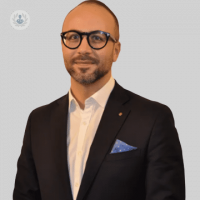How is a stroke diagnosed?
Written in association with:In this article below, esteemed consultant neurologist, Dr Lucio D'Anna, explains what a stroke is, how and why it occurs, and tells us how one can best prevent a stroke.

What is a stroke?
A stroke is a medical emergency that occurs when the blood supply to a part of the brain is interrupted or reduced, depriving brain tissue of oxygen and nutrients. Within minutes, brain cells begin to die, leading to potentially severe outcomes.
What causes a stroke?
Strokes are primarily caused by two mechanisms: ischemic and haemorrhagic events. Ischemic strokes, the most common type, occur when blood clots block a blood vessel in the brain. This can be due to arteriosclerosis (narrowing of arteries) or embolism (blood clots traveling from other parts of the body).
Haemorrhagic strokes, on the other hand, result from a blood vessel in the brain bursting, leading to bleeding within or around the brain. Conditions like high blood pressure, aneurysms, and arteriovenous malformations can increase the risk of haemorrhagic strokes.
What are the symptoms of a stroke?
Recognising the symptoms of a stroke can save lives and reduce long-term disability. Common symptoms include sudden numbness or weakness (especially on one side of the body), confusion, trouble speaking or understanding speech, vision problems in one or both eyes, difficulty walking, dizziness, or loss of balance; and a sudden severe headache with no known cause. The acronym FAST (Face drooping, Arm weakness, Speech difficulty, Time to call emergency services) is a helpful tool for identifying and responding quickly to stroke symptoms.
How is a stroke diagnosed?
When stroke symptoms are present, immediate medical evaluation is crucial. Diagnosis typically involves a physical examination, review of the patient’s medical history, and imaging tests such as CT scans or MRIs to determine the type and location of the stroke. Additional tests, like blood tests and electrocardiograms (ECGs), may be used to identify underlying conditions contributing to the stroke.
Can strokes be prevented?
While some risk factors for stroke, like age and family history, cannot be controlled, many others can be managed through lifestyle changes and medical interventions. Preventive measures include controlling high blood pressure, managing diabetes, quitting smoking, maintaining a healthy diet, engaging in regular physical activity, and limiting alcohol consumption. Medications such as antiplatelets or anticoagulants can also be prescribed to reduce the risk of stroke in high-risk individuals.
Schedule an appointment today with Dr Lucio D'Anna via his Top Doctors profile.


